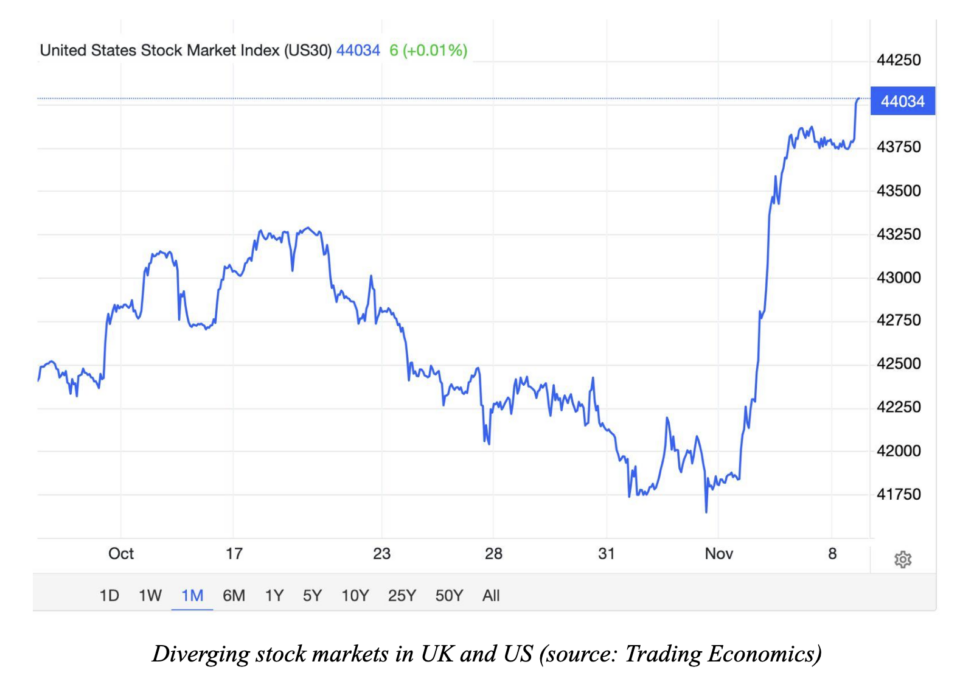| |
|
|
|
|
|
Polarity Across the Pond |
UK heads left, US heads right
Donald J. Trump has swept his way to presidential victory for the second time. In a historic landslide on 6 November, he defied expectations by winning all seven of the critical swing States and gaining “an unprecedented and powerful mandate” for the Republican party. The polls predicting a tight battle were wrong. Not only did Trump surpass the 270 Electoral College votes needed to secure the presidency, he won the popular vote. According to The Washington Times, this is “the equivalent of a political earthquake”: his win reconfigured the electoral map and broke down Blue Wall strongholds.
Trump’s resounding success gives us Brits something to think about, especially in light of the recent Budget of 30 October. This was the first Labour Budget to be announced after nearly 15 years and its content is laid out in the House of Lords Library.
As the past week has shown us, Americans have rejected Bidenomics in favor of right-wing economic policies: an America-first, pro-business model which focuses on growth and lower taxation, while reducing waste and cracking down on immigration. The UK government, on the other hand, is promoting hard-line socialist economic principles reminiscent of the 1970s. As Rachel Reeve’s Budget makes clear, this is tax-and-spend on a massive scale. The BBC outlines the key points at a glance and The Telegraph goes into more depth about the first winners and losers here.
|
|

|
|
Rachel Reeves, Chancellor of the Exchequer (Credit: Getty images) |
|
|
Reeves has announced tax rises worth £40 billion to fund public services such as the NHS. These are the biggest tax rises since 1993, and cover inheritance tax, NIC employer contributions, capital gains tax, and VAT on private school fees. The Budget also announced £140 billion in borrowing over the life of the parliament, which takes the already strained tax burden to its highest level since World War II.
Reeves’ increased public spending comes at the expense of the private sector, so these tax hikes risk edging people out of the labor market and crushing economic growth. Margaret Thatcher’s immemorial words come to mind: “There is no such thing as ‘public money’ – there is only taxpayers’ money”. “It’s no good thinking that someone else will pay…That someone else is you”. Spectator TV has more, bolstering its excellent video content with articles on securonomics and growth: ‘This is nothing to brag about’ – how Labour’s first Budget will crush growth.
|
|
|
The Budget is harsh on small business owners, who apparently do not qualify as “working people” (whose taxes the Labour Party manifesto promised not to increase) – although Rachel Reeves and Keir Starmer cannot get their definitions quite straight. It is harsh on all businesses that employ people, in fact, since Employer NIC is paid on every employee in the private sector: this includes small as well as big companies. Sam Ashworth-Hayes and Annabel Denham at The Telegraph are not in the mood to pull any punches, claiming that the Budget has sown the seeds for Labour’s destruction. They assert that “Sir Keir Starmer’s decision to plunder the private sector to expand the public realm is a huge risk – to him and the country”.
Overall, the Budget is set to put £70 billion into the public sector for each year of this Parliament. And while the upsides of this spending are uncertain, the costs are already clear. No matter who you listen to, Britain looks to be in for a “decade of doom”. […]
Even if Labour’s gamble pays off, we will for years be condemned to pay European levels of taxes for markedly inferior public services, while inflation and interest rates are driven up.
According to Ashworth-Hayes and Denham, part of why “the upsides of this spending are uncertain” is because we are “fixing the unfixable”. “Between the unreformed planning system, the NHS moneypit, the unwillingness to tackle disability claims, and the anti-growth effect of Labour’s regulation, the outlook for Britain’s economy does not look bright.”
They also raise a salient point about the “brain drain”. At what stage do high earners (and thus high-tax payers) say that enough is enough, and when does thriving talent go elsewhere? The top 1% of British earners already pay 29% of all income tax, after all, so “it wouldn’t take very many to leave for Labour’s already shaky fiscal projections to become works of complete unreality.” Taxing business into the ground to pay for an expanded state sector will hardly encourage business to thrive.
… the brain drain is once again creeping back into the national discussion. Doctors are leaving for Australia, engineers for Dubai, and the UK is expected to see the largest exodus of millionaires outside of China.
After a decade and more of lost growth, real wages are still lower than they were in 2008, the tax burden is at record highs, and satisfaction with public services has plummeted. From roads filled with potholes to interminable NHS waiting times, the sense of a state in decay has permeated the public consciousness even as the cost of funding it has risen.
People, in short, are fed up, and justifiably so. [….] people are simply fed up after years of bad news. They put up with austerity to fix the public finances and put the country on a sustainable footing. They endured the Covid lockdowns to shield the vulnerable and keep the NHS functioning. And then the war in Ukraine and slow-motion restart of the global economy saw the cost of living spiral.
This description of the current dejected atmosphere will resonate with many British readers.
The stock market has responded accordingly, falling 300 points from its recent high in mid-October. The independent OBR (Office for Budget Responsibility) downgraded its growth forecasts following the Budget, so the big economic “boost” Reeves promised is illusory. Gilt yields (10-year government bonds) have risen – markets are showing they are reluctant to absorb more borrowing. Massive public sector spending is also inflationary; the doom-loop of “stagflation” lies ahead.
In stark contrast, the US stock market roared after Trump’s decisive win last week, sending the Dow Jones Industrial Average up 1,500 on Wednesday 6 November. Other stocks as Goldman Sachs and JPMorgan helped to drive the gain. Barron’s reports, providing useful examples:
Exchange-traded funds tracking banks jumped the most since November 2020. The Financial Select Sector SPDR Fund, the widely followed fund that holds banks, payment companies, private-equity firms, and insurance companies, was on pace to hit a record high.
Here were the moves on Wednesday:
- Shares of JPMorgan Chase, the biggest U.S. lender and a bellwether for the industry, jumped 11% to a record.
- Bank of America, Citigroup, and Wells Fargo respectively surged 8.4%, 9%, and 13%, while investment banks Goldman Sachs and Morgan Stanley rose 13% and 13%. Goldman, Morgan Stanley, and Wells Fargo hit records.
- Blackstone, the largest private-equity firm, rose 4.2% to a record high.
- Regional banks such as Huntington Bancshares and Regions Financial were soaring. The SPDR S&P Regional Banking ETF, which tracks the industry, was 13%.
The moves reflected investors’ belief that a second Trump administration would take a far softer approach to supervising banks than the Biden administration, giving banks more leeway in their activities and boosting profits.
The following graphs by Trading Economics make the contrast between the mood in UK and US financial markets clear.
|
|
|
|

|
|
Diverging stock markets in UK and US (source: Trading Economics) |
|
|
Elon Musk is tasked with reducing 2 trillion dollars of waste in the US administration. By contrast, Rachel Reeves has just expanded the state. It is clear that we are going in different directions.
On Saturday 2 November, Laura Kuenssberg remarked on how Kemi Badenoch’s appointment as Leader of the Conservative Party has changed the political landscape: “Badenoch’s win and Labour’s big Budget mean we now have a sharper left-right divide”. She is right. But Trump’s election victory has sharpened this divide. His landslide is a vindication of policies centered on economic growth and lowering state intervention. Perhaps this should prompt Labour to reflect on its economic positions.
Labour approval ratings had plummeted already, partly due to the fact that, as Kate Andrews points out, the bulk of Reeves’ big decisions were public knowledge beforehand. The latest Ipsos Political Pulse, taken between 4-7 October, reveals some interesting developments into Labour favorability in the first 100 days of being elected:
- Over half (52%) of Britons are unfavorable towards Starmer (joint highest as Labour leader).
- Labour goes from +6 net favorability upon taking office in July to -21 now.
- When asked to give the government a score between 0 and 10, October’s score is 3.8, down from 4.4 in September.
|
|
|
|
|
It also points out 44% of Britons believe that Reeves is doing a bad job as Chancellor: this is identical to the percentage that thought former Chancellor Jeremy Hunt was doing a bad job at the last Budget in March 2024. How the pendulum swings. The Director of Politics at Ipsos, Keiran Pedley, made the following observation:
These numbers make difficult reading for Keir Starmer and Rachel Reeves, with both registering their worst favourability scores with Ipsos since taking on their respective positions. With 6 in 10 not confident in Labour’s long term economic plan, the pressure is on for the coming Budget to land well, with Labour facing significant political risk if it doesn’t.
Things aren’t looking rosy for Labour, what with the Frockgate and freebies scandal, the “Two-Tier Keir” accusations, and Dawn Butler’s recent shenanigans (I addressed her racial supremacist Black History poem here, but she has been up to more in the meantime, including retweeting a post describing Badenoch as “white supremacy in blackface” and “the most prominent member of white supremacy’s black collaborator class”). An old-fashioned socialist agenda certainly doesn’t help Labour’s cause.
It is safe to say that the Budget has failed to “land well”.
|
|
|
|

|
|
Commentary |
|
The Pogrom in Amsterdam |
|

|
|
Commentary |
|
Say Their Names |
|
|
|
